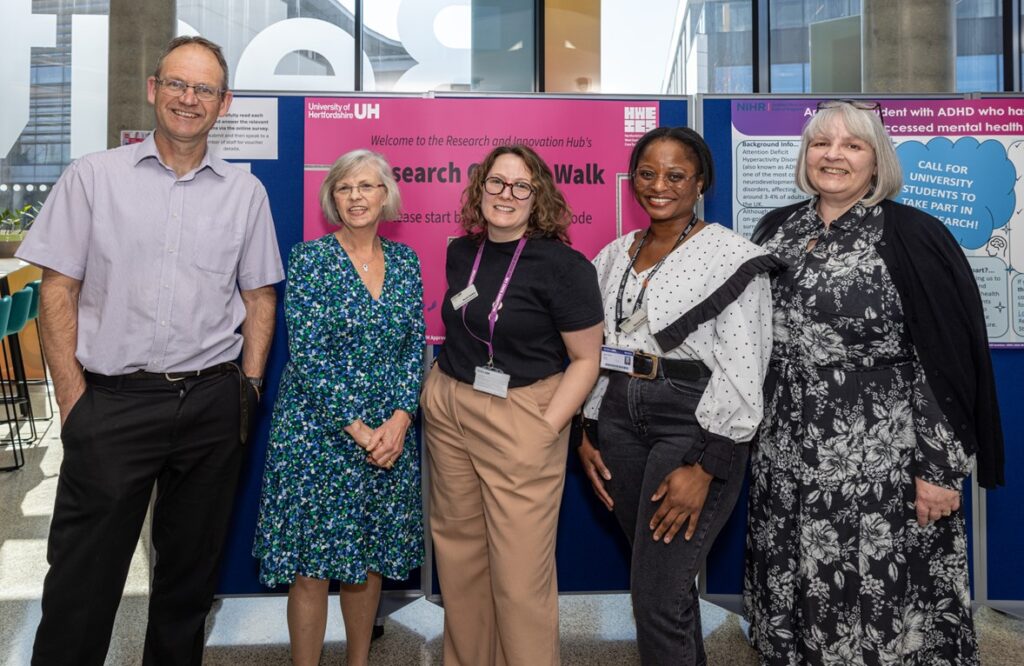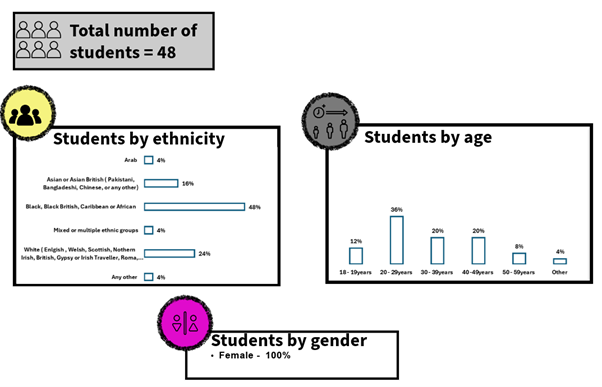This weeks’ blog is by members of the Research and Innovation Hub: Dr Sharon Mutare (s.mutare@herts.ac.uk), Dr Rebecca Hadley (r.hadley3@herts.ac.uk) and Dr Lisa Whiting (all from the University of Hertfordshire) and Dr Phillip Smith and Fiona Smith (Heads of Research and Innovation, Hertfordshire and West Essex ICB).

Improving diversity and representation in research participation is a national priority. This blog highlights how the University of Hertfordshire’s Research and Innovation Hub (the Hub), in partnership with Hertfordshire and West Essex Integrated Care System (H&WE ICS), is supporting this agenda. Through advisory sessions with nursing students from ethnic minority and LGBTQ+ communities, we gathered insights about the barriers and enablers to research participation to inform the planning of future research engagement activities, while also helping to build a stronger research culture within nursing education.
The Research and Innovation Hub
The Hub was launched in January 2024 and is based in the School of Health, Medicine and Life Sciences at the University of Hertfordshire (UH), which serves as its anchor institute. Funded through UH’s Integrated Care System (UHICS) Partnership Programme, acting as a ‘virtual office’ and system facing resource, the Hub was established to strengthen the coordination and delivery of research, innovation and evaluation across the H&WE ICS, and to support the system’s ambition to become a national exemplar in terms of embedding research, innovation and evaluation into health and care delivery.
The development and role of the Student Research Advisory Sessions
The Promoting Access to Research Inclusive Trial Opportunity (PARITY), funded by the National Institute for Health and Care Research (NIHR), aims to address inequalities in health and social care research by funding initiatives to increase participant diversity (NIHR, 2024). As part of this funding, the Hub was commissioned to organise a series of research engagement workshops with UH students from a breadth of ethnic and LBGT+ communities. The primary aim of the workshops was to understand the perceptions, barriers and enablers of research engagement and participation among these groups.
To help inform the format and delivery of the research workshops, and as part of their taught research module, two student advisory sessions were facilitated with a total of 48 second-year students BSc Hons Nursing students (Learning Disability Nursing n = 11; Children’s Nursing n = 37; see Figure 1 for demographics). By embedding the advisory sessions within research modules, we aimed to cultivate a culture of enquiry into research design, application and engagement, and thereby strengthen evidence-based practice.
Through open discussions and interaction with Mentimeter (an online voting system), students gave their views and advised on the aims of the engagement workshops, proposed format of an in-person ‘Research Gallery Walk’, location, and examples of flyers and the types of research studies to be included in the gallery walk.

Key findings from the advisory sessions
The student advisory sessions revealed that students possess a solid understanding of research and methodologies, with many having engaged in research activities such as completing questionnaires or surveys. However, when asked about barriers to research participation, the students highlighted several key issues: a lack of awareness of ongoing studies, accessibility challenges related to travel and the proximity/location of the research, and insufficient financial and professional incentives.
- Barriers and enablers to research engagement
To identify the potential enablers to research engagement and determine the types of studies to focus on in the research engagement workshops, students were asked what would encourage their participation in research.
One student wrote, “If it’s a topic I’m interested to expand my knowledge on, then it helps to be more interested”, while another noted “I don’t find it enjoyable, but maybe I would if it was a topic I was interested in”.
Another student added “I enjoy research as it can give a good insight to Evidence Based Practice (EBP), though some studies I find hard to understand. the conclusions or the findings in journals are written in quite complex ways which takes me a while to go through and understand”.
To further understand the types of research that students are more inclined to engage with, one student stated, “Things that affect me and my family and friends, for example blood pressure, diabetes”.
The students suggested that the research designs should incorporate study information in different languages and formats and provide online alternatives to address accessibility issues. For online surveys or interviews, potential connectivity issues should be anticipated and strategies employed to resolve these expediently to facilitate participation. For in-person participation, compensation for travel should be provided. Additionally, research teams must ensure that all research materials, including the environment and incentives, such as food and beverages, are culturally sensitive and appropriate for individuals from diverse backgrounds and faiths.
While some students are interested in participating in research, they highlighted that financial incentives are a substantive motivator. Students further suggested that participation in research studies and research engagement activities, could be part of their required Nursing and Midwifery Council practice hours and be more overtly documented by, for example, the provision of letters detailing their attendance so that they can include it in their Curriculum Vitae.
- Recommendations for the RIH student engagement research workshops for PARITY
To ensure the planned research engagement workshops were inclusive for students from diverse backgrounds, we were advised to organise the workshops in familiar locations, such as lecture rooms or common areas. They suggested that the research studies chosen as a focus for the workshops should be presented in various formats (such as organising different types of (visual or practical) workshops for different learning types). Additional recommendations included offering the workshops at different times across various days to accommodate students’ schedules.
The students suggested that the University social media platforms, emails, blogs, and newsletters would be effective channels for disseminating the research engagement workshops outcomes.
Key take home message
The student research engagement advisory sessions offered valuable insights into steps that should be taken to enhance nursing students’ involvement in research activities. The diverse student body provided perspectives from typically underrepresented communities. These sessions facilitated connections with peers and research experts, fostering discussions on translating research and applying engagement strategies. Establishing such channels promotes a collaborative environment that enhances critical thinking and increases research visibility and awareness. Integrating these sessions into student research modules cultivates a culture of enquiry into research design, application, and engagement, thereby strengthening evidence-based practice.
Creating a research-friendly culture within nursing education is essential for fostering critical thinking and professional development. Offering both financial and professional incentives, particularly for nursing students, will further motivate participation in research activities, enriching their academic and practical experiences and fostering a culture of evidence-based practice in their future roles.
As we continue to refine and implement these strategies, we can look forward to a future where research engagement is seamlessly integrated into nursing education, leading to improved patient care and outcomes.